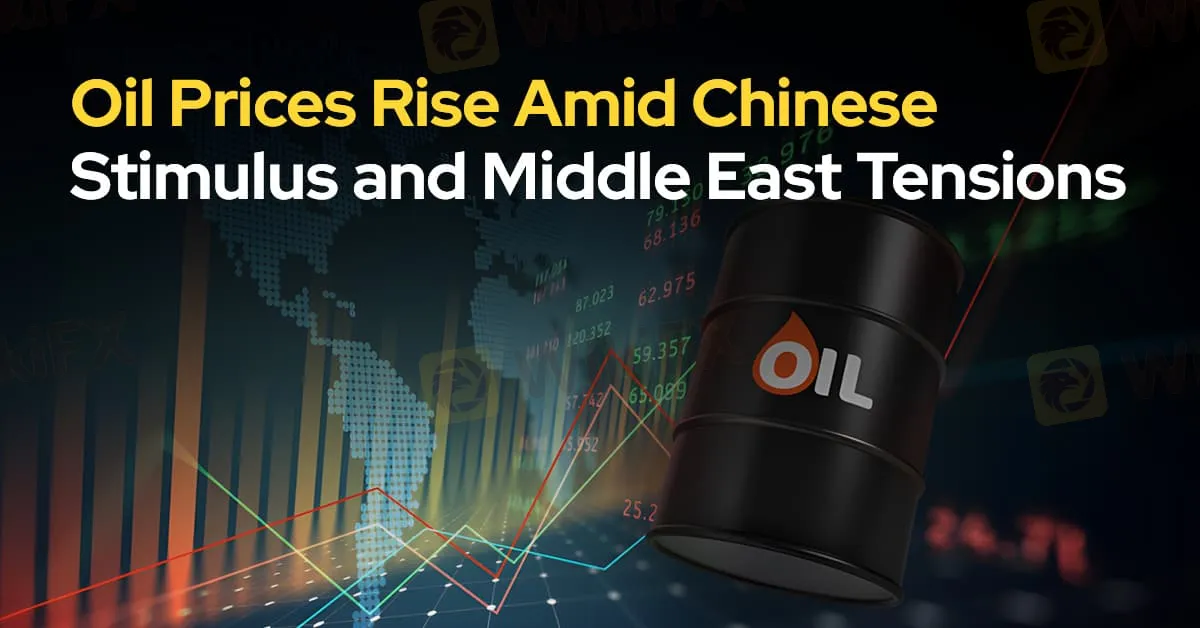简体中文
繁體中文
English
Pусский
日本語
ภาษาไทย
Tiếng Việt
Bahasa Indonesia
Español
हिन्दी
Filippiiniläinen
Français
Deutsch
Português
Türkçe
한국어
العربية
Oil Prices Rise Amid Chinese Stimulus and Middle East Tensions
Abstract:According to report, oil prices experienced a notable increase this week, with Brent crude climbing above $74 a barrel after a period of volatility.

Oil prices experienced a notable increase this week, with Brent crude climbing above $74 a barrel after a period of volatility. This rise follows a series of aggressive economic measures introduced by Chinese authorities, aimed at revitalizing the nations slowing economy. Meanwhile, escalating tensions in the Middle East, particularly involving Israel and Hezbollah, have contributed to the market's volatility.
After dipping by 0.8% on Monday, West Texas Intermediate was trading close to $71. The boost in prices can be attributed to recent announcements from Pan Gongsheng, the governor of the People's Bank of China, who outlined a comprehensive strategy to achieve the country's growth target of around 5% for the year. Key initiatives include enhanced lending capabilities for financial institutions and a reduction in the central bank's short-term interest rates, which are expected to stimulate both economic growth and energy demand in the worlds largest oil consumer.
According to Han Zhong Liang, an investment strategist at Standard Chartered Plc in Singapore, “These measures could positively impact China's demand for oil. The real challenge will be how effectively these lower rates translate into real economic activity.”
Conversely, the oil market is grappling with concerns about a faltering Chinese economy and the potential for increased supply from OPEC+, which has resulted in a 14% decline in prices over the past quarter.
In parallel, the geopolitical landscape has become increasingly tense as Israel launched a series of strikes against Hezbollah positions in southern Lebanon, leading to approximately 500 fatalities—marking the deadliest day of conflict since the 2006 war. Although Iran, a key ally of Hezbollah, has expressed a desire to de-escalate, the situation remains volatile.
As the market reacts to these dual pressures from economic policy and geopolitical tensions, the direction of oil prices will heavily depend on developments in China and the stability of the Middle East shortly.

Disclaimer:
The views in this article only represent the author's personal views, and do not constitute investment advice on this platform. This platform does not guarantee the accuracy, completeness and timeliness of the information in the article, and will not be liable for any loss caused by the use of or reliance on the information in the article.
Read more

OctaFX Flagged by Malaysian Authorities
OctaFX has been officially listed on warning lists by both Bank Negara Malaysia (BNM) and the Securities Commission Malaysia (SC). These alerts raise serious concerns about the broker’s status and whether it is legally allowed to operate in Malaysia.

TradingPRO: A Closer Look at Its Licences
In an industry where safety and transparency are essential, the regulatory status of online brokers has never been more important. For traders seeking to protect their capital, ensuring that a platform operates under recognised and stringent oversight can make all the difference. Keep reading to learn more about TradingPRO and its licenses.

New SEBI Regulations on Intraday Trading
The Securities and Exchange Board of India (SEBI) has implemented revised regulations on Intraday trading, with effect from November 20, 2024. These regulations are meant to lessen risks and prevent speculative trading practices.

Errante Launches Deposit Bonus Offers with Rewards Up to $2,000
Errante has introduced a new deposit bonus promotion for first-time clients. Under this offer, eligible traders can receive a bonus of up to 30% on their initial deposit, with a maximum bonus amount capped at USD 2,000.
WikiFX Broker
Latest News
How much money will you earn by investing in Vantage Broker?
IronFX vs Exness Review 2025: Comprehensive Broker Comparison
Fraudsters Are Targeting Interactive Brokers' Users with Lookalike Emails
Everything you need to know about ADSS
SkyLine Guide 2025 Malaysia: 100 Esteemed Judges Successfully Assembled
Vantage Markets Review 2025: Trusted Forex and CFD Trading Since 2009
Top Tips to Choose the Best Forex Broker in 2025
SEBI Notifies New F&O Rules for Investors - New Derivative Trading Limits & More Amendments
Interactive Brokers: Global Office Visits and Licensing Details
U.S. Jobs Data Released: A Potential Boost for Gold Prices
Currency Calculator


